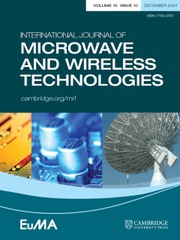Dielectric material selection of microstrip patch antenna for wireless communication applications using Ashby's approach
Published online by Cambridge University Press: 14 July 2014
Abstract
In this paper, material selection has been done for dielectric substrate material in microstrip patch antenna (MPA) for three distinct classes of wireless communication applications using Ashby's approach. This material selection procedure is based on the creation and evaluation of Ashby's chart of different material indices. These material indices in turn affect the device performance indices, which decide the best possible dielectric material to be used as substrate for MPAs. In this work, quality factor, relative permittivity, and temperature coefficient of resonant frequency are chosen as material indices of MPA's dielectric substrate to get relevant performances. Ashby's selection chart shows that 0.75MgAl2O4–0.25TiO2 material for millimeter waves applications, Ca[(L1/3Nb2/3)0.85Ti0.15]O3−δ for mobile base station applications, and (Ba0.95Ca0.05)O–Sm2O3–4.5TiO2 ceramic for mobile phone miniaturization applications are the promising materials that allows best overall performance in MPAs for wireless communication.
Keywords
- Type
- Research Paper
- Information
- International Journal of Microwave and Wireless Technologies , Volume 7 , Issue 5 , October 2015 , pp. 579 - 587
- Copyright
- Copyright © Cambridge University Press and the European Microwave Association 2014
References
REFERENCES
- 5
- Cited by


